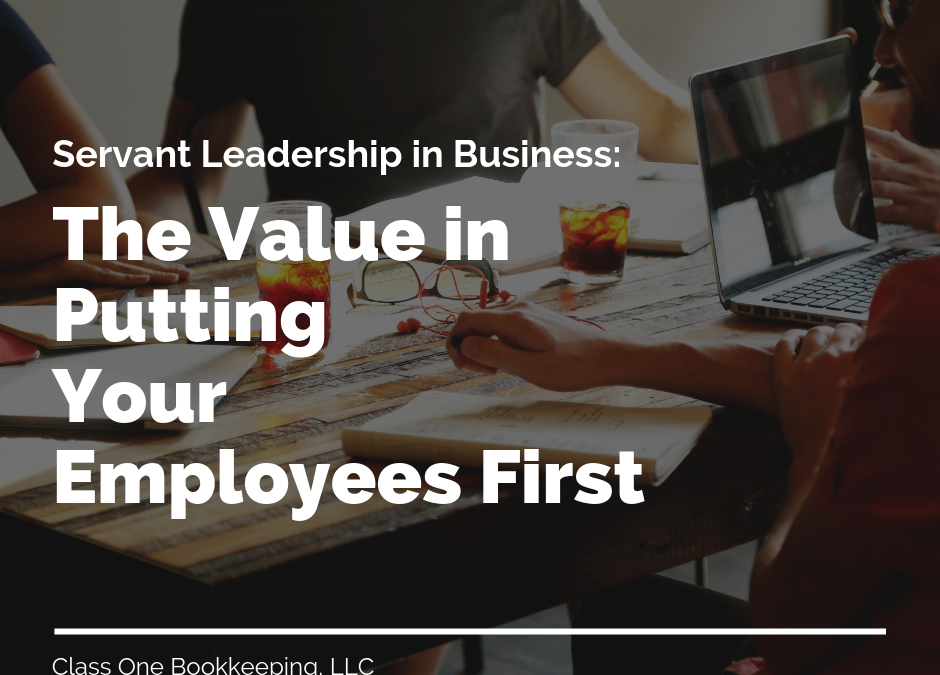Everyone has worked for that one boss who led with authority, micromanaged employees of all levels, and never seemed to value employees’ ideas for change. How long did you work for that company? No matter the length, I bet it felt too long. The good news is that you are your own boss now! But how do you make sure your company doesn’t fall victim to these same management pitfalls that undervalue employees and drives (pushes) great employees away?
You need a management team that models the behavior you expect from all your employees. You do not want power-hungry management whose only leadership is “my way or the highway.” There is no room, let alone opportunity, for improvement or innovation when someone controls versus coaches employees. You need servant leaders that are concerned with improving your human capital to improve your financial gains.
What is Servant Leadership?
Servant Leadership is “a leadership philosophy in which an individual interacts with others – either in a management or fellow employee capacity – with the aim of achieving authority rather than power. The authority figure intends to promote the well-being of those around him or her. Servant leadership involves the individual demonstrating the characteristics of empathy, listening, stewardship and commitment to personal growth toward others.”[i]
The Benefits of Servant Leadership
This type of management model has multiple company wide benefits.
- Employees who feel personally invested in are more likely to invest in your company –financially, physically, and emotionally.
- Employees are more inclined to contribute to the company on a higher productivity level when they see management is contributing to the company’s success and not their own promotional tracks.
- Management that gives credit to their employees or teams versus taking the praise for themselves builds excitement and pride in employees for their job and work.
- Better employee relationships are built when managers personally invest time and effort into molding employees, which leads to a happier work environment and positive company image.
These small benefits add up in discernible ways. Servant leadership creates life long employees, who promote company success before personal success because they are loyal and enthusiastic, which fosters better work ethic, as well as a healthy and happy work environment, where people feel supported beyond their finances.
Ways to Incorporate Servant Leadership
The base line expectation for education continues to grow in the United States, which only heightens peoples’ desire to utilize their hard-earned collegiate skills; however, that does not mean your potential employees with formal education are industry ready or know your specific business’s culture. There is always going to be a need to train your staff, so why not make every interaction count.
- Your management should exercise availability and approachability, which encourages employees to express concerns and new ideas.
- The company organizational structure needs to be visible and understood, allowing employees to plan their prospective rise through the company ranks.
- Give employees opportunities to demonstrate and prove their value outside of hard-fixed responsibilities. This often has the added benefit of making sure employees are not bored, as their value is utilized and their sense of agency is nurtured.
- Lastly, implement positive language in the work place. Chick-fil-a’s “my pleasure” and “thank you” uplift more than the customer.
Servant Leadership Can Apply to Any Company
Regardless of your company’s structure, you can integrate these practices into your business. Welcome new employees by taking a genuine interest in their professional goals and then help employees achieve them. (Extra savvy managers will help employees shape their goals around your business.) Allow employees autonomy to try and integrate new methods even for mundane tasks. Make sure that you’re inadvertently, but intentionally, teaching employees about your company as a whole by practicing transparency from the top down.
Finally, don’t be afraid to take cues from other companies in your industry or other industries that are doing these things well and are ranking as top places to work. With the current low employment job market, employees have the advantage. Make sure you’re competing! Offer a positive work atmosphere that encourages employees to grow and invest in your company because you invested in them first, and be patient as you await the rewards of converting to a servant leadership business model.
Contact Class One Bookkeeping, LLC today for more ideas on building a better business culture within your company.
[i] Kenton, W., Servant Leadership, (Investopedia, 2017).


Recent Comments